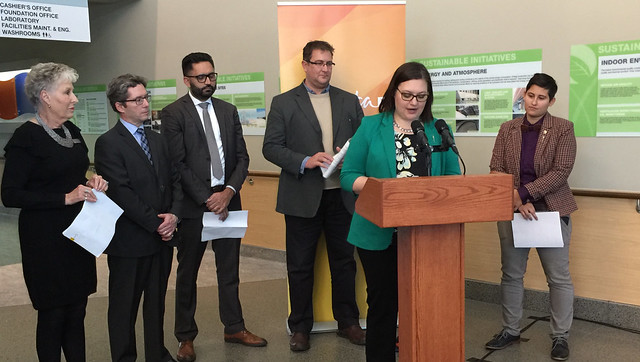This release was issued under a previous government.

Associate Minister of Health Brandy Payne announces the opening of a new opioid treatment clinic in the Strathcona Community Hospital in Sherwood Park.
As part of the province’s commitment to support Albertans and address the harms associated with the opioid crisis, Alberta Health Services (AHS) is expanding treatment options in Sherwood Park.
The satellite clinic will provide medication-assisted treatment and counselling to an additional 100 people struggling with opioid use disorder each year.
“Expanding the opioid dependency treatment program beyond Edmonton’s urban core is critical to saving lives. This new clinic in Sherwood Park will help people living with opioid dependency receive their treatment closer to home. Making sure treatment is available for Albertans when they reach out for support is key as we continue to support families and individuals affected by the opioid crisis.”
The clinic is an expansion of the opioid dependency program offered in downtown Edmonton and will improve access to care for people in Sherwood Park and the surrounding area. Since January 2016, 12 people with links to Strathcona County have died from an apparent opioid overdose. Also during that time, there have been 235 emergency department visits related to opioids by patients from the Sherwood Park area.
“Through our recent Community Talk initiative, we heard that gaining access to needed services is a challenge in our community. When a family member becomes addicted to opioids, our whole community suffers. This issue crosses all demographics of users – sons, daughters, moms and dads can all fall into the dependency trap. The new provincially funded opioid dependency clinic means citizens attempting to create a healthy lifestyle, free of addiction, will now be able to access needed treatment – right here in our community.”
“This is excellent news. Making this program available closer to home will save lives.”
A physician and registered nurse will run the clinic every Wednesday, 9 a.m. to 4 p.m., and will initiate new patients on Suboxone or methadone treatment. Patients will be able to receive their daily medications from a Sherwood Park pharmacy and will be linked to counselling and support from the addiction and mental health clinic also located in the Strathcona Community Hospital.
"We are opening doors for more people to get the help they need which is so critical when it comes to providing treatment. This clinic will provide hope for more Albertans who struggle with opioid use, and their loved ones who support them."
“Living with substance use is difficult. At AHS, we want to do all we can to make sure help is available when people are ready. By providing treatment in Sherwood Park, we are making it easier to get help closer to home, which is a very important factor when people decide to access treatment.”
Patients will also be able to visit the Edmonton Opioid Dependency Program Monday to Friday, 7 a.m. to 7 p.m., should they need additional care.
The Sherwood Park satellite clinic is scheduled to open in December as part of the provincial government’s $4.6-million commitment to work with AHS to expand access to opioid treatment in the Edmonton and Calgary areas.
With $2.4 million of that grant, the Edmonton region is opening the clinic in Sherwood Park, expanding the Opioid Dependency Program in Edmonton, enhancing detoxification services at the AHS Addiction Recovery Centre and providing opioid dependency treatment at the Boyle McCauley Health Centre. It is also expanding the mobile harm-reduction outreach program to allow followup with patients discharged after an opioid overdose, and to help people at risk by ensuring they have access to naloxone kits and prevention training.
All told, new and expanded clinics in the Edmonton and Calgary areas will serve more than 2,500 new patients each year.